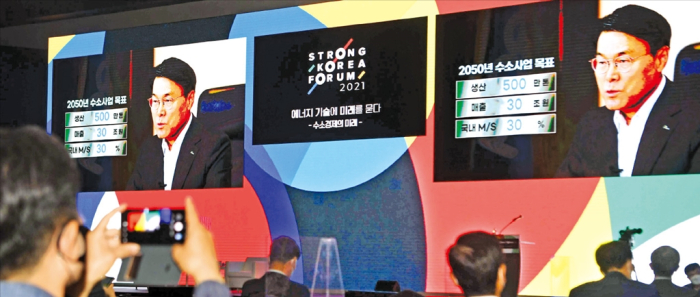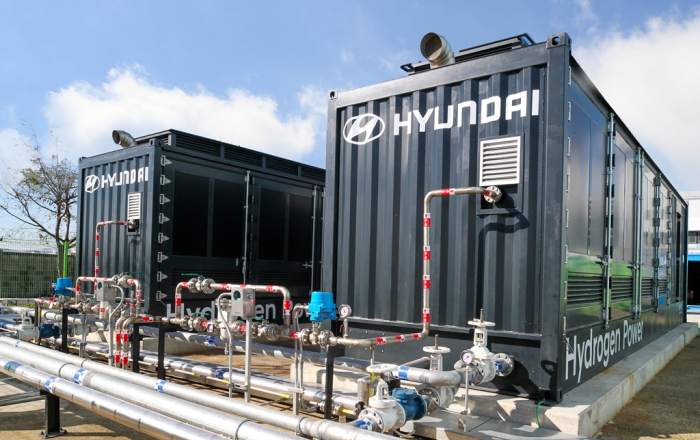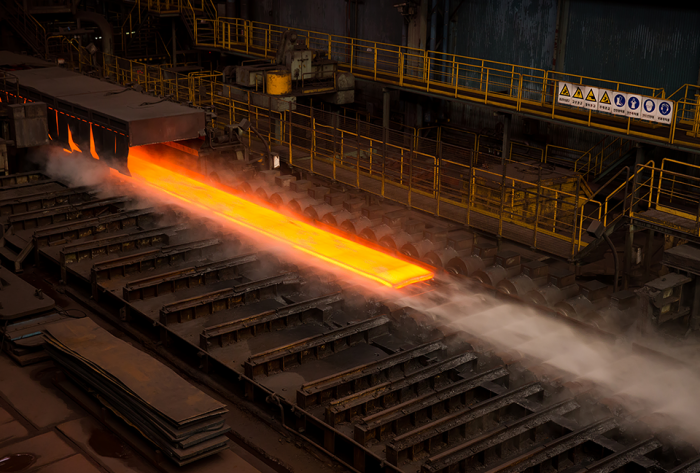Hydrogen economy
POSCO chairman: Future at stake without co's hydrogen push
The steelmaker eyes 30 trillion won in hydrogen business sales by 2050
By May 27, 2021 (Gmt+09:00)
3
Min read
Most Read
CarlyleŌĆÖs Rubenstein sees commercial real estate undervalued


Infrastructure secondaries continue to rise amid inflation: Stafford


Goldman Sachs names Choi Seoul office chief


Golf equipment maker Taylormade to refinance $222 mn of debt


NPS' former key players move to law firms as its voting power increases



Choi Jeong-woo, chairman of POSCO, South KoreaŌĆÖs largest steelmaker, said itŌĆÖs no exaggeration to say that the companyŌĆÖs future is at stake without embracing the industryŌĆÖs paradigm shift toward the hydrogen economy.
Choi, also the chief executive of the steel giant, reaffirmed the companyŌĆÖs goal to achieve carbon neutrality by 2050 with annual sales of 30 trillion won ($27 billion) in the hydrogen business by that year.
ŌĆ£No other company will be more desperate than POSCO to embrace the hydrogen economy. ItŌĆÖs a matter of life and death for a steelmaker like us,ŌĆØ Choi said during an opening speech for the Strong Korea Forum 2021 hosted by The Korea Economic Daily and the Ministry of Science and ICT on May 26.
The steel industry has been known as one of the main culprits of air pollution. POSCO is KoreaŌĆÖs top carbon-emitting company with 81.5 million tons of greenhouse gas emissions in 2019, according to the environment ministry,
ŌĆ£To become carbon neutral by 2050, we need to drastically change the way we produce steel. WeŌĆÖre going to abandon the traditional blast furnace method to adopt an eco-friendly one to make steel. That will be a challenge for us,ŌĆØ he said.
In February, POSCO said it is joining hands with Hyundai Motor Co. to develop technology that uses hydrogen instead of coking coal to produce steel in line with the government initiative to shift to a hydrogen economy.
As part of such efforts, the two companies also agreed to cooperate in hydrogen-related projects and explore overseas business opportunities.
NEW STEELMAKING TECHNOLOGY
The new technology will allow POSCO to use hydrogen gas as a fuel and reducing agent in its blast furnaces to make steel ŌĆō a process that doesnŌĆÖt emit greenhouse gases such as carbon dioxide.
Under current steelmaking technology, 0.75 ton of coking coal is required to make one ton of steel, which emits about two tons of carbon dioxide as a byproduct.

Currently, POSCO manufactures 38 million tons of steel annually, and turning to new steelmaking technology will require about 3.75 million tons of hydrogen, it said.
The company said it will establish a facility that can produce 5 million tons of hydrogen by 2050 to self-supply the gas needed for steelmaking.
According to US consulting firm McKinsey & Co., the Korean economy will need 16.9 million tons of hydrogen in 2050.
Chairman Choi said POSCOŌĆÖs ultimate steelmaking goal is to use green hydrogen that is created using renewable energy instead of fossil fuels.
SEEKING OVERSEAS HYDROGEN PARTNERS
ŌĆ£We plan to establish green hydrogen-producing facilities abroad and introduce the gas to Korea for use and sale. WeŌĆÖre in talks with companies in Australia, the Middle East and Latin America,ŌĆØ he said.
POSCO is also looking to enter a hydrogen-fueled gas turbine business through its affiliate POSCO Energy Co.
The steel giantŌĆÖs hydrogen push comes as tougher global environmental regulations on carbon emissions are driving governments and private companies to embrace the hydrogen economy, which utilizes hydrogen as a fuel for heat, hydrogen vehicles, energy storage and long-distance energy transport.

A majority of KoreaŌĆÖs top 10 conglomerates, including Hyundai and SK, have said they are entering or already established hydrogen-related businesses as their future growth drivers.
ŌĆ£For the Korean economy to shift toward a hydrogen one, POSCO alone canŌĆÖt make it happen. We need cooperation from other companies as well as administrative and policy support from the government in developing core technology,ŌĆØ said Choi.
Write to Kyung-Min Kang at Kkm1026@hankyung.com
In-Soo Nam edited this article.
More to Read
-
 Hydrogen economyEight of top 10 Korean conglomerates betting on hydrogen
Hydrogen economyEight of top 10 Korean conglomerates betting on hydrogenMay 12, 2021 (Gmt+09:00)
5 Min read -
 Paradigm shiftHydrogen, aerospace, materials: key words for Korean business leaders
Paradigm shiftHydrogen, aerospace, materials: key words for Korean business leadersApr 01, 2021 (Gmt+09:00)
4 Min read -
 Hydrogen tie-upHyundai Motor, POSCO steelmaking tie-up to develop hydrogen tech
Hydrogen tie-upHyundai Motor, POSCO steelmaking tie-up to develop hydrogen techFeb 23, 2021 (Gmt+09:00)
2 Min read
Comment 0
LOG IN


